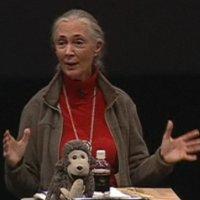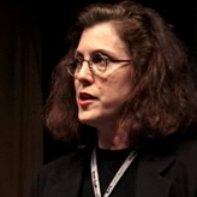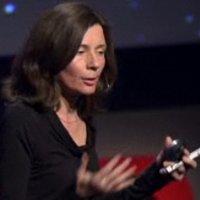Susan notes: I've copied and pasted this biographical information and talk unabashedly from the TED website.
 Philosopher-comedian Emily Levine talks (hilariously) about science,
math, society and the way everything connects. She's a brilliant
trickster, poking holes in our fixed ideas and bringing hidden truths
to light. Settle in and let her ping your brain.
Philosopher-comedian Emily Levine talks (hilariously) about science,
math, society and the way everything connects. She's a brilliant
trickster, poking holes in our fixed ideas and bringing hidden truths
to light. Settle in and let her ping your brain.
Humorist Emily Levine works a heady vein of humor, cerebral and
thoughtful as well as very, very amusing. Oh, she's got plenty of
jokes. But her work, at its core, makes serious connections -- between hard science and pop culture,
between what we say and what we secretly assume ... She plumbs the
hidden oppositions, the untouchable not-quite-truths of the modern mind.
2009-09-27
Posted in TED Talks (Individual)
Susan notes: I've copied and pasted this biographical information and talk from the TED website.
 Jane Goodall hasn't found the missing link, but she's come closer than
nearly anyone else. The primatologist says the only real difference
between humans and chimps is our sophisticated language. She urges us
to start using it to change the world.
Jane Goodall hasn't found the missing link, but she's come closer than
nearly anyone else. The primatologist says the only real difference
between humans and chimps is our sophisticated language. She urges us
to start using it to change the world.
Her extensive research
into the behavior of chimpanzees, which started in Africa in the 1960s
and continues today, fundamentally altered scientific thinking about the relationship between humans and other mammals.
2009-09-27
Posted in TED Talks (Individual)
Susan notes: Thanks to TED for making its Talks and related information available for downloading and embedding. I've just watched this talk for the second time, and, although it's more than 10 years old, I'm still captivated by Laurel's insights and comments. I particularly liked the interviews with REAL little girls.
I was also touched by Laurel's closing in which she said:
... we're incorporating what we've learned about girls -- their desires to experience greater emotional flexibility, and to play around with the social complexity of their lives...what we're giving girls, I think, through this effort, is a kind of validation, a sense of being seen. And a sense of the choices that are available in their lives. We love them. We see them. We're not trying to tell them who they ought to be. But, we're really, really happy about who they are. It turns out they're really great.
 A TED archive gem. At TED in 1998, Brenda Laurel asked: Why are all the
top-selling videogames aimed at little boys? She spent two years
researching the world of girls (and shares amazing interviews and
photos) to create a game that girls would love.
A TED archive gem. At TED in 1998, Brenda Laurel asked: Why are all the
top-selling videogames aimed at little boys? She spent two years
researching the world of girls (and shares amazing interviews and
photos) to create a game that girls would love.
Brenda Laurel has been part of several major
revolutions in the way humans use computers: virtual reality,
interactive narratives and some fresh approaches to gaming.
2009-09-27
Posted in TED Talks (Individual)
Susan notes: I've copied and pasted this biographical information and talk unabashedly from the TED website.
 Cognitive researcher Nancy Etcoff looks at happiness -- the ways we try
to achieve and increase it, the way it's untethered to our real
circumstances, and its surprising effect on our bodies.
Cognitive researcher Nancy Etcoff looks at happiness -- the ways we try
to achieve and increase it, the way it's untethered to our real
circumstances, and its surprising effect on our bodies.
In her book Survival of the Prettiest, Nancy Etcoff refutes
the social origins of beauty, in favor of far more prosaic and
evolutionary explanations. Looking for a partner with clear skin?
You’re actually checking for parasites. And let’s just say there’s a reason high heels are always in fashion.
2009-09-27
Posted in TED Talks (Individual)
Susan notes: I've copied and pasted this biographical information and talk unabashedly from the TED website.
 Physicist Patricia Burchat sheds light on two basic ingredients of our
universe: dark matter and dark energy. Comprising 96% of the universe
between them, they can't be directly measured, but their influence is
immense.
Physicist Patricia Burchat sheds light on two basic ingredients of our
universe: dark matter and dark energy. Comprising 96% of the universe
between them, they can't be directly measured, but their influence is
immense.
Burchat studies the universe's most basic ingredients -- the mysterious
dark energy and dark matter that are massively more abundant than the
visible stars and galaxies. She is one of the founders of the BaBar Collaboration
at the Stanford Linear Accelerator Center, a project that's hoping to
answer the question, "If there are as many anti-particles as there are
particles, why can't we see all these anti-particles?"
2009-09-27
Posted in TED Talks (Individual)
 Philosopher-comedian Emily Levine talks (hilariously) about science,
math, society and the way everything connects. She's a brilliant
trickster, poking holes in our fixed ideas and bringing hidden truths
to light. Settle in and let her ping your brain.
Philosopher-comedian Emily Levine talks (hilariously) about science,
math, society and the way everything connects. She's a brilliant
trickster, poking holes in our fixed ideas and bringing hidden truths
to light. Settle in and let her ping your brain.
 Jane Goodall hasn't found the missing link, but she's come closer than
nearly anyone else. The primatologist says the only real difference
between humans and chimps is our sophisticated language. She urges us
to start using it to change the world.
Jane Goodall hasn't found the missing link, but she's come closer than
nearly anyone else. The primatologist says the only real difference
between humans and chimps is our sophisticated language. She urges us
to start using it to change the world.
 A TED archive gem. At TED in 1998, Brenda Laurel asked: Why are all the
top-selling videogames aimed at little boys? She spent two years
researching the world of girls (and shares amazing interviews and
photos) to create a game that girls would love.
A TED archive gem. At TED in 1998, Brenda Laurel asked: Why are all the
top-selling videogames aimed at little boys? She spent two years
researching the world of girls (and shares amazing interviews and
photos) to create a game that girls would love.
 Cognitive researcher Nancy Etcoff looks at happiness -- the ways we try
to achieve and increase it, the way it's untethered to our real
circumstances, and its surprising effect on our bodies.
Cognitive researcher Nancy Etcoff looks at happiness -- the ways we try
to achieve and increase it, the way it's untethered to our real
circumstances, and its surprising effect on our bodies.
 Physicist Patricia Burchat sheds light on two basic ingredients of our
universe: dark matter and dark energy. Comprising 96% of the universe
between them, they can't be directly measured, but their influence is
immense.
Physicist Patricia Burchat sheds light on two basic ingredients of our
universe: dark matter and dark energy. Comprising 96% of the universe
between them, they can't be directly measured, but their influence is
immense.